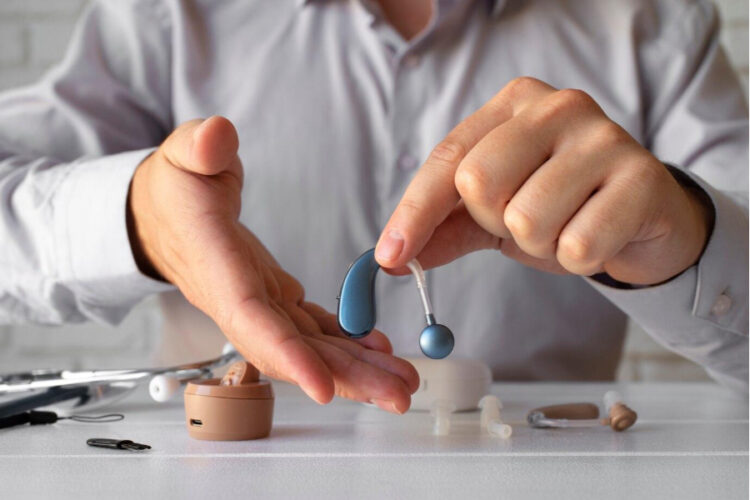Understanding Hearing Loss and Its Impact on Quality of Life
Hearing loss affects more than just hearing—it can diminish quality of life. It makes everyday activities like conversations and watching TV challenging, leading to frustration, isolation, and mental strain. Social connections and cognitive function may suffer, and in the workplace, it can cause misunderstandings, reduce productivity, and pose safety risks. Treating hearing loss enhances not only hearing but also emotional well-being, mental clarity, and overall daily life.
The Role of an ENT Specialist in Hearing Health
ENT specialists play a key role in diagnosing and managing hearing loss. With expertise in ear anatomy, they identify causes like infections, aging, or blockages and offer targeted treatments. ENTs often work alongside audiologists—while audiologists handle hearing tests and devices, ENTs address medical issues that may restore hearing without aids. They also support patients in choosing and adjusting to hearing aids, ensuring comfort and effectiveness. This collaborative care provides a complete solution for better hearing health.
Types of Hearing Aids: Finding the Right Fit for You
Choosing the right hearing aid can be overwhelming due to the variety of models designed for different types of hearing loss and lifestyle needs. The most common types include behind-the-ear (BTE), in-the-ear (ITE), in-the-canal (ITC), and completely-in-the-canal (CIC) aids, each with distinct advantages based on hearing severity and personal preference.
Behind-the-ear aids are versatile and powerful, suitable for mild to profound hearing loss. Their design makes them easy to adjust and clean, offering durability for many users. For a more discreet option, ITE and ITC aids are smaller and fit within the ear or ear canal, offering a natural listening experience for those with mild to moderate hearing loss, though they may not be as powerful as BTE models.
An ENT can help determine the best hearing aid type for your needs, ensuring optimal comfort and performance.
How to Prepare for Your ENT Appointment
Preparing for your ENT appointment can make a big difference in addressing hearing loss. Note specific situations where hearing is difficult, like in noisy settings or when needing a louder volume. Bring your medical history, including past ear issues and medications, and any hearing aids you’ve used. Prepare questions about your hearing, treatment options, or hearing aids to ensure a clear understanding of your condition. Being organized helps you get the most out of your visit and take confident steps toward better hearing.
What to Expect During a Hearing Evaluation
A hearing evaluation is a thorough process to assess the extent and type of hearing loss. During the evaluation, an ENT specialist, often with an audiologist, will conduct painless, non-invasive tests to measure your ability to hear different sounds, tones, and speech.
The process begins with a review of your medical history and concerns, followed by a physical exam of your ears to check for blockages or abnormalities. You’ll then undergo audiometric tests in a soundproof booth, where you’ll listen to tones at various volumes and frequencies. Speech recognition tests may also be included to assess how well you understand speech in quiet and noisy settings.
The results will form an audiogram outlining your hearing thresholds, and your ENT will discuss the findings and recommend suitable interventions, such as hearing aids or other treatments.
The Importance of Personalized Hearing Aid Fitting
A personalized hearing aid fitting is essential to ensure the device meets your unique hearing needs and lifestyle. This process involves not only selecting the right model but also precise calibration to optimize performance. An ill-fitting hearing aid can cause discomfort, feedback, and poor amplification, undermining its effectiveness.
During the fitting, your hearing aid will be programmed according to your audiogram results, amplifying the frequencies you need while maintaining comfort and clarity. The ENT specialist or audiologist will also guide you on how to use and care for the device, including insertion, battery changes, and volume adjustments.
Follow-up appointments are crucial for making any necessary adjustments based on your real-world experience. These sessions ensure your hearing aid is fine-tuned for optimal performance, allowing you to enjoy the best possible auditory experience.
Maintenance and Care for Your Hearing Aids
Proper maintenance is key to the longevity and effectiveness of your hearing aids. Regular cleaning prevents issues like wax buildup and moisture damage. Use a soft cloth to wipe the exterior and the provided tools to clean the earmold or tubing. Avoid water or solvents that can harm the device.
Store your hearing aids in a dry, safe place, ideally with a dehumidifying case. Replace batteries as needed and keep spares on hand. Your ENT can offer model-specific care tips to ensure optimal performance.
The Emotional and Social Benefits of Better Hearing
Improved hearing brings significant emotional and social benefits, enhancing independence and confidence. Regaining clear hearing reduces isolation and allows fuller participation in conversations and activities, leading to a richer quality of life.
Better hearing strengthens social connections, making interactions more enjoyable and meaningful, which is vital for emotional well-being. It also reduces anxiety and frustration from miscommunication, boosting self-esteem and opening up new opportunities for personal and social growth. Addressing hearing loss can profoundly enhance both emotional and social well-being.
Conclusion: Taking the First Step Towards Better Hearing
Embarking on the path to better hearing can significantly enhance your quality of life. By working with your ENT specialist, you’ll receive personalized care tailored to your unique needs, from selecting the right hearing aid to thorough evaluations and ongoing support.
The benefits of improved hearing go beyond just hearing better—they include enhanced communication, increased social interactions, and a boost in confidence. By addressing hearing loss, you’re investing in your overall well-being and enriching your life with the sounds around you.
Don’t let hearing loss hold you back. With your ENT’s expertise and the right hearing aid, you can unlock a world of sound and enjoy a more connected, fulfilling life. Take the first step today!

